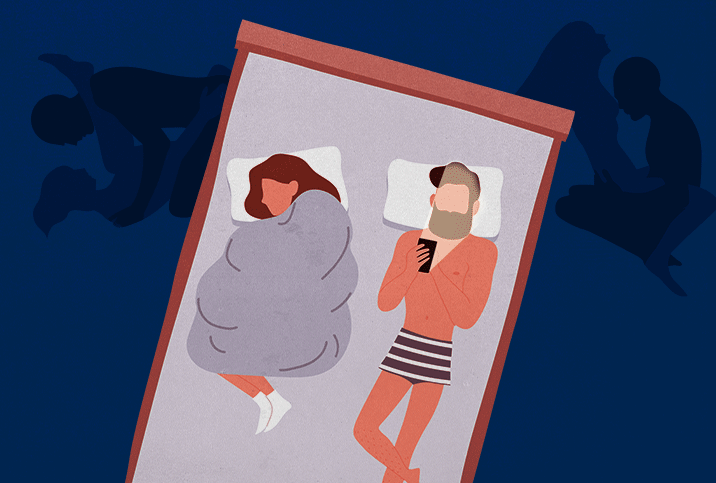It's Time to Try Masturbating Without Porn

Before we get into it, we didn't write this article to hate on porn. Our real goal is to talk about re-sensitizing ourselves to sensation and stimulus.
The reasons a person watches or doesn't watch porn are complex. If pornography brings you pleasure, full steam ahead. If watching it is a substitution for having difficult conversations with a partner or with yourself—well, that could be worth more consideration. In any case, we're going to focus on centering your habits a bit more au naturel.
Back to basics
Too often, sex can feel performative or goal-centered, and that mindset can easily transfer to your time alone. Sex therapist Martha Kauppi emphasized that to prioritize pleasure, you need to focus on the fundamentals.
"People should learn to have some awareness of what's going on in their body," she said. "So we're back to mindfulness practices [involving] embodiment and awareness of sensation, because we spend an awful lot of time in our head…. We're not always aware of what our left little toe is experiencing right now. Come into your physical experience of pleasure rather than narrating it."
Kauppi encouraged physical awareness and acuity as a foundation for centering pleasure. This can take many forms, such as breath regulation, stopping and taking a moment to focus on, as she would say, what your little toe is experiencing right now, or even committing to movement therapy.
While we're on the basics, psychiatrist Sheldon Zablow outlined the physiological mechanics behind orgasms, a process known as entrainment.
"Orgasms are unique combinations of physical, psychologic, endocrinologic and neurologic responses to rhythmic sexual stimulation, by self or other," Zablow explained. "This stimulation builds neural rhythms. The neural synchrony of these four physiologic processes in a rhythmic way that leads to sexual pleasure is called entrainment."
Rhythm nation
Perhaps the most important element of this explanation for the layperson is the word "rhythm." Rhythm feels good in music and feels even better in sex. Rhythm, just like what your little toe is feeling, is a sensation and we can become desensitized or especially sensitive to it through focus, patience and practice.
"Neurologically, the brain goes through numerous changes before, during and after an orgasm, coordinating over 30 regions of the brain," Zablow said. "One of the first regions involved as entrainment builds is a reduction in the function of the frontal cortex that controls judgment. This reduction decreases anxiety. The function of the thalamus increases, which improves coordination of information coming in from the outside and the emotions produced on the inside. The amygdala also activates, reducing the influence of past memories on current behaviors, facilitating the opportunity for pairing."
The thalamus is located just above the brainstem between the cerebral cortex and the midbrain, with extensive nerve connections to both. The primary function of the thalamus is to relay motor and sensory signals to the cerebral cortex.
First off, let's take a moment just to appreciate the behind-the-scenes mind-body melding occurring to reach a sexual climax. Besides our judgment taking a backseat to visceral functions and our mind priming us to bond with a sexual partner, Zablow pinpoints the thalamus as the primary reason we become so sensitive to stimulus.
Stimulus is good—in fact, Kauppi directly links external stimulus and our arousal.
"Some people like to watch something sexy, which might be a human right next to them, might be a movie," she said. "Some people like to listen to something sexy—might be something recorded, might be something their partner is whispering in their ear. Some people like to experience sensations that feel sexy in multiple places, so some people like to use their imagination. The more sensory input, the more likely the higher arousal."
What turns you on?
Regardless of whether you watch or listen to pornography, it's good to keep in mind this simple equation: more input equals more arousal. Of course, some people are more likely to be overwhelmed than others, but only you know your personal threshold. Remember, any of your senses are fair game.
Perhaps there's a favorite smell or perfume that turns you on. Tactile sensations aren't limited to a sexual partner touching us—silky, soft bed sheets, a warm bath or running an ice cube over your body will work wonders. If your once-favorite sex toy has left you feeling unfulfilled recently, try a softer setting or masturbating with your hands.
Just because there's not another person present isn't a reason to skip foreplay. Taking more time feeling your erogenous zones and savoring the in and out of your breath can make the time spent on your genitals much fuller.
Therapists and scientists agree human beings are massively complex processors of input. Most of us live in modern communities positively brimming with input, and the only way for our brain to protect us and keep our attention span in something resembling one piece is to drown a lot of the stimulus out. This extends to our feelings, both emotional shifts and literal physical feelings. There's a lot about ourselves and our own complexities that goes underappreciated, whether because of past influences or because there's just too much going on.
If pornography has been feeling more like a distraction than a turnon lately, consider slowing down and scaling back to the basics.




















